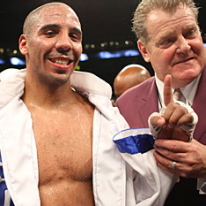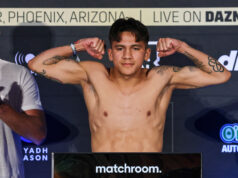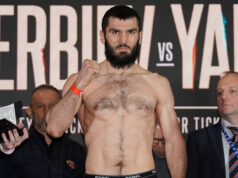
On a perfect evening in the ring, a night when American Andre Ward and Englishman Carl Froch both were able to make their very best fight, Ward would win. The only circumstance under which Froch could prevail, then, is an off-night for Ward. Froch realized this Saturday, and it razed his spirit. It meant no matter his willfulness or tenacity, he was not the world’s best super middleweight.
Such broken-spiritedness tempered by stubborn professionalism is what Froch showed the waning moments of his match with Ward at Boardwalk Hall in Atlantic City, Saturday, in the championship of the Super Six World Boxing Classic. Ward prevailed, of course, by unanimous scores of 118-110, 115-113 and 115-113.
My card concurred with the judges’: 117-113. I scored rounds 1, 2, 3, 4, 6, 7 and 12 for Ward. I scored rounds 5, 9 and 11 for Froch. And I had rounds 7 and 10 even.
Ward won the fight. Nothing said this more eloquently than Froch’s face when the final bell sounded. Froch was a beaten, disappointed, proud man who had been given the opportunity he’d awaited his entire career and learned he was not great as he’d hoped. That two judges had the fight decided by a single round was just, insofar as the round went Ward’s way. Three scores of 115-113 for Ward would have been no problem; a draw or decision for Froch would have been unfortunate.
“I was actually surprised by how slow Froch was,” Ward said after the fight.
There are lots of old sayings in boxing, clichés we call “sayings” to spare their speakers, and one is that you cannot teach speed. But you can teach a fighter to offset another’s speed – as Juan Manuel Marquez thrice proved against Manny Pacquiao – with practice, timing and introspection. Yes, introspection. You cannot teach a fighter to offset another’s speed till he admits the other man is faster.
Such an admission Froch’s camp never drew from their man in training camp. Froch, who calls himself “The Cobra,” did not believe Ward, with his shorter frame, could get his left fist to Froch’s face quickly as Froch could do the same to Ward. It was a miscalculation born of Froch’s hubris, hubris that has taken him much farther in prizefighting than any but his familiars predicted.
That Ward realized he was faster than Froch for every instant of the match’s opening nine minutes cannot be disputed. What Ward chose to do with that advantage, though, is what makes him unique among undefeated American fighters. Ward went inside. Leading 3-0 after the first quarter, Ward went for Froch’s heart. He put himself on Froch’s chest and tried to break the larger man’s body the way he’d already cracked his spirit. It didn’t work – Froch was still there with three rounds to go, and gaining speed too – but it was a hell of a noble idea on Ward’s part.
Did Ward tire late because he lacked conditioning? No. Ward tired in the closing rounds because Steve Smoger did a job that should be shown at referee clinics round the world. Referee Smoger watched Ward and Froch tangle their limbs in the match’s opening seconds and didn’t break them. He stood well back and said resolve your differences like men and prizefighters.
There was something splendid about Smoger’s inactivity. His silence told Ward and Froch that if they were to lunge at one another gracelessly and tie themselves in a knot, he would not be the one to work their ways out of it. The choice then became: Expend energy pulling your arms from between the opponent’s elbow and ribcage, or catch his head and shoulder and free fist in your face.
In the fight’s opening half, Froch was discomfited by Smoger’s inactivity, drooping his arms behind Ward’s back, looking frantically over and round Ward’s bobbing head. In the later rounds, it was Ward, unable to retreat or set traps behind a late-arriving southpaw stance, who wanted Smoger’s help. But Smoger did not intervene, and Ward had to earn his victory by winning the final round. As it should be.
“He was too close,” Froch said about Ward’s attack. “Or he was too far out of range.”
If Froch’s countenance in the moment of the final bell was the fight’s most eloquent commentary, that line above is a close runner-up. It is the very definition of championship prizefighting. Ward made Froch uncomfortable by doing nothing how Froch wanted him to, for 36 minutes, on the largest stage of his career.
Perhaps Ward is not inspiring to an impoverished nation the way Pacquiao is. Certainly Ward is not provocative as Floyd Mayweather. But if the path to greatness is a long and anfractuous one, Ward has yet to step off it. In a moment of quiet contemplation, that is, can you think of a fighter who is likely to have a greater body of work in the next decade than Andre Ward?
Ah, but Boardwalk Hall was damn quiet while your future legend practiced on Froch! Yes, how unfortunate. It allowed cynics to look at Ward-Froch, a consequential fight between highly regarded tacticians in an empty American arena, and see an ironical bookend to a year that began in Pontiac Silverdome. If Ward-Froch deserves a pass, it is because the match was a made-by-television event.
But the Super Six is over, and Showtime, as the super middleweight division’s de facto sanctioning body, needs to set a new course. A venue for Andre Ward versus Canada’s Lucian Bute, a fight the network is now obliged to make, should be chosen thusly: Whoever bids the lowest licensing-fee-to-live-gate ratio. Tie promoters’ compensation to their ability to make live crowds, and see what happens.
Prizefighting is not the Super Bowl. The idea of neutral venues has proved asinine. Ward-Bute must happen in Oakland or Montreal, not Atlantic City or Las Vegas.
Bart Barry can be reached at bart.barrys.email (at) gmail.com









